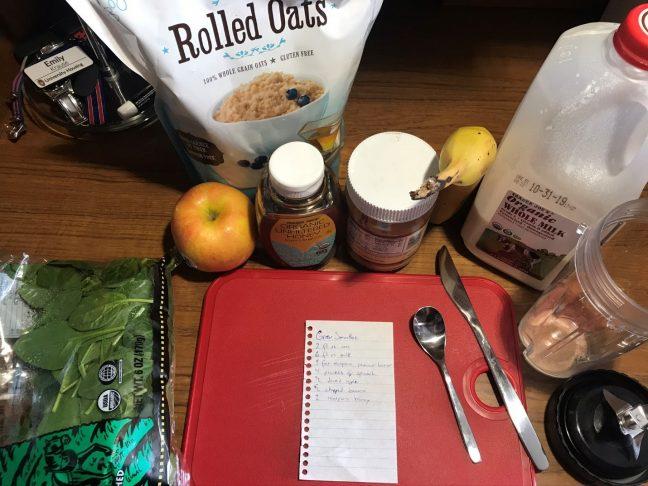Spring semester can be a stressful time. Homework, jobs and extracurricular activities pile on and leave the immune system compromised, unable to fight off colds and the flu effectively.
If you have bad luck this semester and get sick, it can be hard enough to just get out of bed, let alone take care of yourself. Here are some quick tips on what to do to get back to being healthy as fast as possible after falling ill.
-
Liquids really are important.
It’s the first thing your mom or the doctor says for a good reason. Water and electrolytes affect a variety of body processes, including heart rate, nerve signals and immune function.
Water is the best choice, but other clear liquids like sports drinks or sodas are sometimes good choices to replenish electrolytes. For those who find it hard to tolerate flavored beverages, try diluting the drink with water.How much fluid is enough? The usual recommendation is to get six eight-ounce glasses a day. However, because the ill are at a greater risk of dehydration, more than six glasses a day is advised during sickness.
-
Stock up on pre-prepared foods and healthy snacks in advance.
Fatigue and nausea can be counter-productive when trying to cook healthy meals. At your next visit to the grocery store, try picking up some healthy frozen dinners and canned soups for easy-to-make meals as a precaution to illness.
Healthy snacks like nuts, dried fruits and whole grain cereals are usually well tolerated and packed with vitamins and minerals. -
Beware of high fat foods.
Greasy foods may be comforting, but fat is the most difficult nutrient to digest and can exacerbate symptoms. Try to pick out simple forms of carbohydrates and light protein sources, such as whole grains, low-fat yogurt or hard-boiled eggs.
-
Eat small, frequent meals and separate eating and drinking.
Having an upset stomach can make eating seem counterproductive, but it is important to keep getting energy and nutrients to the immune system so it functions at its best.
Eating smaller meals is often more easily tolerated on a sensitive stomach. Also, by eating solids and drinking liquids at different times, feelings of fullness and the risk of vomiting are more likely to be avoided. -
Eat your biggest meal when you have the most energy.
Lack of appetite is a common symptom of colds and the flu. Try to tackle the task of eating when you have the most energy. It will be easier to prepare food at that time. It is important to keep getting fluids, calories and nutrients to avoid fatigue and boost the immune system.
-
Exercise is all right if you don’t have a fever or fatigue.
For very active people, being confined to the couch can seem to make matters worse rather than better. Mild to moderate exercise can help clear nasal passages and alleviate congestion. However, skip the workout if feelings of exhaustion or an elevated temperature are present. Exercise alters your body temperature and tires out your muscles, which are unsafe when ill.
Listen to your body. If a workout feels like too much, it probably is and it may prolong the illness. If exercise sounds like a good idea, make sure to cut down the time and lighten the intensity as a safety precaution. Even if you are training for a specific event, taking a week off to get healthy is in your best interest. -
Let someone know you don’t feel well and know when to ask for help.
It can be easy to isolate yourself when feeling ill, but letting someone close know you aren’t feeling well can be helpful if things become serious. Having someone around to make sure there is a stock of tissues and fluids can lend comfort and also means an outside pair of eyes is keeping watch. Sometimes it can be hard to know when things are serious enough to go the doctor without the help of another person.
-
Remember medications treat symptoms, not the illness itself.
Over-the-counter drugs can claim on TV they can cure the cold or flu, but they really only try to alleviate your symptoms. Remember that self-medicating won’t make you better–only rest and time will. If you have questions about what to take, talk to your doctor.
-
Stay home.
If you have a fever or the flu, you’re better off staying home. Contact your boss or professor and explain what is ailing you. He or she will likely understand that others should not have to risk catching your illness.
-
The best medicine is prevention!
Flu shots are free at University Health Services, so there is no reason to take a chance on getting sick. Remember to cover your coughs, wash your hands frequently and let your sick friends know they should stay home and get healthy to avoid spreading their sickness.
This week’s recipe can be frozen and heated up when it’s needed most. It is full of vegetables and protein to keep an immune system going strong.
Vegetable Bean Soup
Makes 6 servings
Ingredients:
1 cup sliced carrots; 1 cup sliced zucchini; 3/4 cup chopped onion; 1/2 cup chopped red pepper; 1 tablespoon olive oil; 2 cans (14 1/2 ounces each) vegetable broth; 1 can (16 ounces) kidney beans, rinsed and drained; 1 can (16 ounces) white beans, undrained; 1 can (15 ounces) garbanzo beans or chickpeas, rinsed and drained; 1 can (14 1/2 ounces) stewed tomatoes, cut up; 1 cup frozen corn; 4 teaspoons ground cumin; 2 tablespoons minced fresh cilantro
Directions:
In a large saucepan or Dutch oven, saute the carrots, zucchini, onion and red pepper in oil until crisp-tender. Add the broth, beans, tomatoes, corn, cumin and cayenne; bring to a boil.
Reduce heat; simmer, uncovered, for 30-35 minutes or until vegetables are tender, stirring occasionally. Stir in cilantro; ? teaspoon cayenne pepper can also be added for a little spice.





















